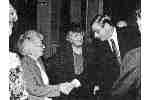
|
Jim Edwards, MP, meeting with Mrs. Mary Manko Haskett, and Frances Haskett, Ottawa, March 1993 (Photo by F. Monte) |
The Canadian government should acknowledge the mistreatment and jailing of Ukrainian Canadians during the First World War, Edmonton MP Jim Edwards said Tuesday.
Disagreeing with fellow Tory leadership hopeful Jean Charest, Edwards disputed the environment minister's conclusion that a slave labor camp for 600 Ukrainian immigrants near Banff from 1915-17 was not of sufficient importance for the Canadian public to remember.
"Castle Mountain and the internment camp there was of historic significance," Edwards said. "It's appropriate to recognize it."
During the war, more than 5,000 Ukrainian-Canadian men, women and children were sent to concentration camps because they originated in a part of Ukraine that was within the Austro-Hungarian empire, then at war with the Allies.
At Castle Mountain, one of the largest of the 26 jails across Canada, work crews were forced at gunpoint to build roads and the famous Banff Springs golf course. Few were ever paid. They were poorly fed. Some committed suicide. Rolls of barbed wire still mark the site.
Activists have been lobbying for several years for Parliament to admit the 1914-20 internments across Canada were "unwarranted and unjust." They also want Parks Canada to erect historical markers at all of the jails, develop an interpretive centre at Castle Mountain and offer symbolic compensation.
Charest recently informed the Ukrainian Canadian Civil Liberties Association that the 17-member Historic Sites and Monuments Board had recommended in March, 1991 against any special exhibit.
In a Feb. 23 letter to Lubomyr Luciuk, association director of research, Charest said that while the monuments board found the forced incarceration to be "an episode of interest, the internment within Canada's national parks...of ethnic Ukrainians, the great majority of whom were, at the time, citizens of countries at war with Canada, is not, in and of itself, of national historic significance."
The minister said he personally accepted the recommendation, adding some recognition of what happened could be considered as part of the "presentation of the human history" of the park.
Putting up a roadside sign as suggested is "insufficient" and "completely unacceptable," Luciuk said. "It's an insult.
"Our whole argument has always been if you remember, there's a better chance of not repeating the mistakes again."
The geography professor at Royal Military College in Kingston, Ont. also can't figure out why Charest sat on the board's recommendation for two years. He added that in 1915, the British government had advised Canada that these Ukrainians were "friendly aliens" and should be given "preferential treatment."
Canada's Ukrainian community will remember that Edwards, Patrick Boyer, another leadership candidate, and Alberta MPs such as Liberal David Kilgour and Independent Alex Kindy are more sympathetic to the principle of redress, Luciuk said.
"I give (Edwards) at this point top marks. Mr. Charest has not done himself any favor by potentially alienating a one-million-member constituency."
His remarks were echoed in Edmonton by John Chomiak, who said Charest is going to make a "dynamic" prime minister one day.
But Chomiak could only shake his head in disbelief that Charest could deny the historic significance of Ukrainians being stripped of their assets and interned.
"He really didn't do his homework," said Chomiak, head of the PC Canada Fund, the fund-raising arm of the party and president of Elk Island riding association. "It doesn't make cultural sense; it doesn't make political sense; it doesn't make sense at all."
Provincial Liberal Leader Laurence Decore said it was "wrong and outrageous" for Charest to deny Ukrainians an opportunity to commemorate a most unhappy part of Canadian history.
"This is a matter of deep hurt to the Ukrainian community," said Decore, adding that his own grandmother, although a Canadian citizen, was forced to carry an enemy alien card on her person. Decore recalled stories from his father of how Ukrainians would be picked up and interned if someone phoned the RCMP and claimed they were meeting and plotting against the Canadian government. "This is how horrible it was," he said.
Provincial Liberal Leader Laurence Decore: "This is a matter of deep hurt to the Ukrainian com-munity."
John Chomiak, head of the PC Canada Fund: "It doesn't make cultural sense; it doesn't make political sense; it doesn't make sense at all."
Lydia Shulakewych, past president of the Ukrainian Canadian Congress Alberta Provincial Council: "If a potential leader of a country is so insensitive, how can he assume such a position?"
Lubomyr Luciuk, Ukrainian Canadian Civil Liberties Association: "Our whole argument has always been if you remember, there's a better chance of not repeating the mistakes again."
![]() Return to Righting An Injustice Page
Return to Righting An Injustice Page
![]() Return to Internment of Ukrainians in Canada 1914-1920 Page
Return to Internment of Ukrainians in Canada 1914-1920 Page
![]() Return to Ukrainian History Page
Return to Ukrainian History Page
![]() Return to InfoUkes Home Page
Return to InfoUkes Home Page
Document URL: http://www.infoukes.com/history/internment/booklet02/doc-077.html
Copyright © 1994 Ukrainian Canadian Civil Liberties Association
Copyright © 1994 Lubomyr Luciuk
We acknowledge the help in the preparation of this document by Amanda Anderson
Page layout, design, integration, and maintenance by G.W. Kokodyniak and V. Pawlowsky
Copyright © 1996-1997 InfoUkes Inc.
E-mail: internment@infoukes.com
|
since Mar 1 1997 |
InfoUkes Inc. Suite 185, 3044 Bloor Street West Etobicoke, Ontario, Canada M8X 2Y8 Tel: (416) 236-4865 Fax: (416) 766-5704 |
Originally Composed: Wednesday December 4th 1996.
Date last modified: Thursday October 30th 1997.